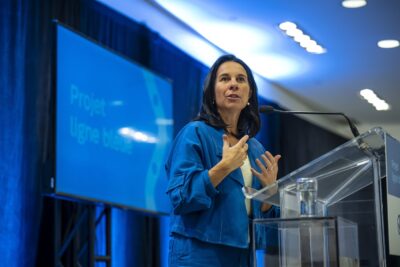Montreal mayor sees opening of UN-Habitat office as part of her political legacy
By Canadian Press on September 18, 2025.

MONTREAL — Outgoing Montreal Mayor Valérie Plante says Thursday’s inauguration of a sixth UN office in the city is a reflection of the environmental, housing-focused agenda she’s championed in her nearly eight years in office.
Almost three years after it was first announced, the United Nations Human Settlements Programme, or UN-Habitat, is opening its project office in the city with an initial team of nine employees and a mission that includes promoting “inclusive, safe, resilient, and sustainable cities and human settlements.”
Plante, who is not seeking re-election in November, said she’s “thrilled” that the office is opening before her term ends.
“I’m really proud, because as a mayor who did push forward the climate change and environmental agenda so far in the last eight years, it’s almost like a recognition of that work,” she said in an interview Wednesday at city hall.
“But also (the United Nations was) interested in the ecosystem here in Montreal,” she continued. “There’s universities, there’s talents, and also there’s this way of thinking where we believe that creating green and inclusive neighbourhood and housing projects is absolutely crucial and important.”
Plante became the first woman elected to lead Montreal in 2017, when she scored an upset victory against her incumbent rival — and former federal cabinet minister — Denis Coderre.
She ran on promises of improving public transit and lessening road congestion, as well as adding green spaces and social housing.
As mayor, she’s brought in environmental policies protecting pollinators and creating parks, including so-called “sponge parks” that absorb excess rainfall as a climate change mitigation strategy. Along the way, she’s also been accused of being anti-car and of focusing too much energy on expanding bike paths and pedestrianizing streets at the expense of other priorities.
She’s also faced criticisms that her signature bylaw forcing developers to include social and affordable housing in new constructions has been ineffective at alleviating a growing housing crisis.
Plante said the opening of the UN office is validation, in a way, for her approach, which includes “having climate change in mind” in every project the city undertakes, from housing to public transit to sewer upgrades.
She is hopeful that her successor will continue her legacy, even as other governments appear to be wavering on environmental commitments.
“It’s so important, especially when maybe other levels of governments might kind of go back on some priorities, Montreal needs to stand strong and continue to fight for innovation when it comes to fighting climate change, decreasing our emissions, protecting biodiversity,” she said.
Protecting the environment is ultimately “a health matter” that contributes to Montrealers’ well-being, she argued.
“A mayor that would decide to go back on those priorities, I think would kind of turn their back on citizens’ health,” she said. “And I don’t think we should accept that.”
UN-Habitat’s executive director, Anacláudia Rossbach, said Montreal was chosen for the office because of support from all levels of government, and the presence of experts in both housing and climate resilience.
“I’m talking about research centres, I’m taking about universities, I am talking about the local governments, I am taking about the NGOs, the community-based organizations, all the experiences that Canada has,” she said in a video interview from Nairobi, Kenya, ahead of a trip to Montreal for the inauguration ceremony.
She said Canada is also a leader in areas relevant to the office, including climate-resilient urban infrastructure and strong mortgage institutions.
While housing challenges in developed countries might seem different from those in the Global South, Rossbach says there are common denominators. Those include a “historic affordability gap” and homelessness, which she says is estimated to affect 300,000 people around the world.
While each place has its own housing challenges, Rossbach says she sees the role of UN-Habitat as translator or “conduit” to help bring different ideas together.
“I’m quite aware that we cannot just replicate a model, replicate an experience, take from one country to the other, even throughout the Global North or throughout the Global South, right?” she said.
“The contexts are very different. But we can help. We can help to incorporate some principles, to be inspired by some mechanisms that are there, by some lessons learned, and then translate to the different contexts.”
The office was first announced in December 2022, as Montreal hosted the UN Biodiversity Conference, COP15. Rossbach, who joined the program more recently, wasn’t clear on why it took so long to open. “Perhaps the office was waiting for me,” she said.
She said the office’s first mission, recruiting staff and forming alliances, is well underway. Another early priority will be assembling a strong group of stakeholders from Canada to attend the World Urban Forum in Azerbaijan, as well as ongoing participation on a housing working group with UN member countries.
The office, which is located in downtown Montreal, is expected to eventually employ about 20 people.
This report by The Canadian Press was first published Sept. 18, 2025.
Morgan Lowrie, The Canadian Press
29-28




